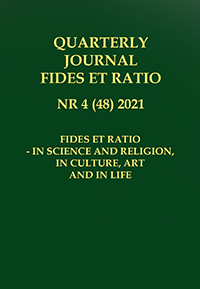Abstract
The present study focuses on the anthropological factors that constitute a kind of specifically human vulnerability. This typically human fragility can be expressed in many different ways that have something in common with fallibility, faultiness, which consists in an oscillation between greatness and finitude. As far as vulnerability itself is concerned, it means a susceptibility to being easily affected, an exposure to injury. Insofar as I speak, in the rest of this research, of the phenomenon of self-deception, it is a question, in the case being investigated, of making injury to oneself. In order to understand how it is possible to wound oneself in the analysed sense, it seems necessary to refer to some kind of maintaining a rupture, of an inconsistency within a set of convictions that one forms about oneself, other people, and the world.
My investigation below is divided into four parts. First, I describe analytically, and from a rather epistemological perspective, the essential components that define the phenomenon of self-deception. To do so, I will rely mainly on Donald Davidson's well-known text Deception and Division. Secondly, I briefly review the more important solutions that have been proposed to deal with the difficulty in question. These proposals can be classified into two groups: the first contains the solutions that consider the conflicting beliefs in terms of their intentionality; the second group of solutions, on the contrary, includes the non-intentional solutions. The brief examination of them shows that the most philosophically promising views bear the mark of an insurmountable weakness and therefore require new approaches. Thirdly, I propose to take up some of the achievements of Paul Ricoeur's thought and I justify my choice. In addition, I try to establish a link between the problem of self-deception and the Ricoeurian theme of attention. Fourthly and finally, starting from the Ricoeurian phenomenology of attention, I present a possible understanding of self-deception that would keep both the intentionality of the opposing convictions (and thus the philosophical scope of the problem) and its rootedness in a real human experience (and thus a concrete, less abstract character of the approach than the one referring to mathematical models). As a result, the study offers a new understanding of vulnerability as a constituent of the human condition.
References
Abel, O., Porée, J. (2009). Le vocabulaire de Paul Ricœur, Paris: Ellipses.
Barnes, A. (1997). Seeing through self-deception, Cambridge, New York: Cambridge University Press.
Baumeister, R.F., Heatherton, T.F. (1996). Self-Regulation Failure: An Overview, Psychological Inquiry, 7 (1), 1-15.
Baumeister, R.F., Heatherton, T.F., Tice, D. M. (1994). Losing control: how and why people fail at self-regulation, San Diego: Academic Press.
Davidson, D. (2004). Problems of rationality, Oxford, New York: Clarendon Press, Oxford University Press.
Depraz, N. (2015). Attention et surprise. Paul Ricœur en débat et au-delà, Alter, 23, 261-278. Elster, J. (ed.). (1986). The multiple self, Cambridge: Cambridge University Press.
Fiasse, G. (2015). Amour et fragilité: regards philosophiques au cœur de l’humain, Québec: Presses de l’Université Laval.
Fingarette, H. (2000). Self-deception, Berkeley: University of California Press.
Foucault, M. (2001). L’herméneutique du sujet: cours au Collège de France, 1981-1982, Paris: Gallimard, Seuil.
Husserl, E. (1985). Idées diretrices pour une phénoménologie, tr. P. Ricœur, Paris: Gallimard. Marion, J.-L. (1991). Dieu sans l’être, Paris: Quadrige.
McLaughlin, B.P., Rorty, A. (eds.). (1988). Perspectives on self-deception, Berkeley: University of California Press.
Mele, A.R. (2001). Self-deception unmasked, Princeton, N.J.: Princeton University Press.
Mele, A.R., Rawling P. (eds.). (2004). The Oxford handbook of rationality, Oxford, New York: Oxford University Press.
Piłat, R. (2013a). Aporie samowiedzy, [Les apories de la connaissance de soi], Warszawa: Wydawnictwo IFiS PAN.
Piłat, R. (2013b). Powinność i samowiedza: studia z filozofii praktycznej, [Obligation and self- knowledge: studies in practical philosophy], Warszawa: Wydawnictwo Uniwersytetu Kardynała Stefana Wyszyńskiego.
Ricœur, P. (1996). Soi-même comme un autre, Paris: Éditions du Seuil.
Ricœur, P. (2013). Anthropologie philosophique. Écrits et conférences 3, Paris: Éditions du Seuil. Ricœur, P. (2009). Le volontaire et l’involontaire, Paris: Éditions Points.
Stanghellini, G., Rosfort, R. (2013). Emotions and personhood: exploring fragility, making sense of vulnerability, Oxford: Oxford University Press.

